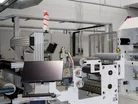UK Prime Minister opens UKBIC battery manufacturing facility

What is the UKBIC?
Established in 2018, following a competition led by the Advanced Propulsion Centre, the UK Battery Industrialisation Centre (UKBIC) is part of the UK Government’s Faraday Battery Challenge (FBC), racing to develop battery technology ‘for the transition to a greener future’.
The facility aims to facilitate the link between battery technology - which has proven to be promising in laboratory and prototype settings - with successful mass production.
Based in Coventry (UK) the battery product development facility is publicly-funded, and welcomes collaborations with manufacturers, entrepreneurs, researchers and educators to develop green jobs and prosperity in the UK.
FBC is a government programme that aims to fast track the development of cost-effective, high-performance, durable, safe, low-weight and recyclable batteries. Funding received by the UKBIC comes from UK Research and Innovation, the Industrial Strategy Challenge Fund, and the West Midlands Combined Authority.
The UKBIC project is delivered through a consortium of Coventry City Council, Coventry and Warwickshire Local Enterprise Partnership and WMG, at the University of Warwick.
“Through focused capabilities, we will enable industry, via open access, to scale up and commercialise advanced technologies central to the development and manufacture of batteries, initially for the automotive sector but with wider application,” says the UKBIC.
Latest Developments From the UKBIC
Officially opened by the UK Prime Minister, Boris Johnson, the £130mn UK Battery Industrialisation Centre (UKBIC) totalling 18,500 square metres is ready to support the UK industry with the development of battery technologies and future electrification.
“UKBIC is a beacon of innovation and ingenuity- shining the way for a brighter, greener future for the battery sector in the UK. It was an honour to open this world-class facility today and I cannot think of a more fitting backdrop here in Coventry to speak about the government’s ambitious agenda to level up across the UK,” said The Rt Hon Boris Johnson MP, Prime Minister.
“This facility will help to deliver green growth and jobs as industrial demand accelerates in the UK battery sector. With the technology and government-backed expertise on offer right here in Coventry, I have no doubt that UKBIC will become world leaders in the industry.”
The Coventry facility has been designed to support the UK’s ambitious climate change targets, including achieving net zero carbon emissions by 2050, and to end the sal of petrol and diesel cars and vans by 2030.
“The importance of the battery sector to the UK economy cannot be underestimated. The Faraday Institution believes that the equivalent of seven large gigafactories will be needed in the UK and employment in the automotive industry and battery supply chain could grow from 170,000 to 220,000 by 2040. As we all look to recover from the impact of Coronavirus, we have the opportunity to help make the UK a global leader in batteries, with UKBIC and the Faraday Institution supporting the UK battery industry to become world leaders,” said Jeff Pratt, Managing Director, UKBIC.
How Can the UK Use the UKBIC?
Any organisation working on batteries for electric vehicles, rail, aerospace, industrial equipment, domestic equipment, and static energy storage can use the facility to better understand how their advanced technologies can be scaled up successfully before committing to a huge investment for mass production.
The UKBIC has over 80 battery technicians, engineers, and support staff with plans to expand this further.
“I’m delighted that UKBIC is open for business. Completed at deliberate speed during the pandemic, UKBIC is a key part of the UK Government’s Faraday Battery Challenge, created to fast track the commercialisation of cost-effective, high-performance, durable, safe, low-weight and recyclable batteries. The battery manufacturing equipment installed covers the whole production process from electrode manufacturing, cylindrical and pouch cell assembly, to formation ageing and testing and battery modules and packs. The facility is also a training centre to upskill the UK battery sector,” said Pratt.

